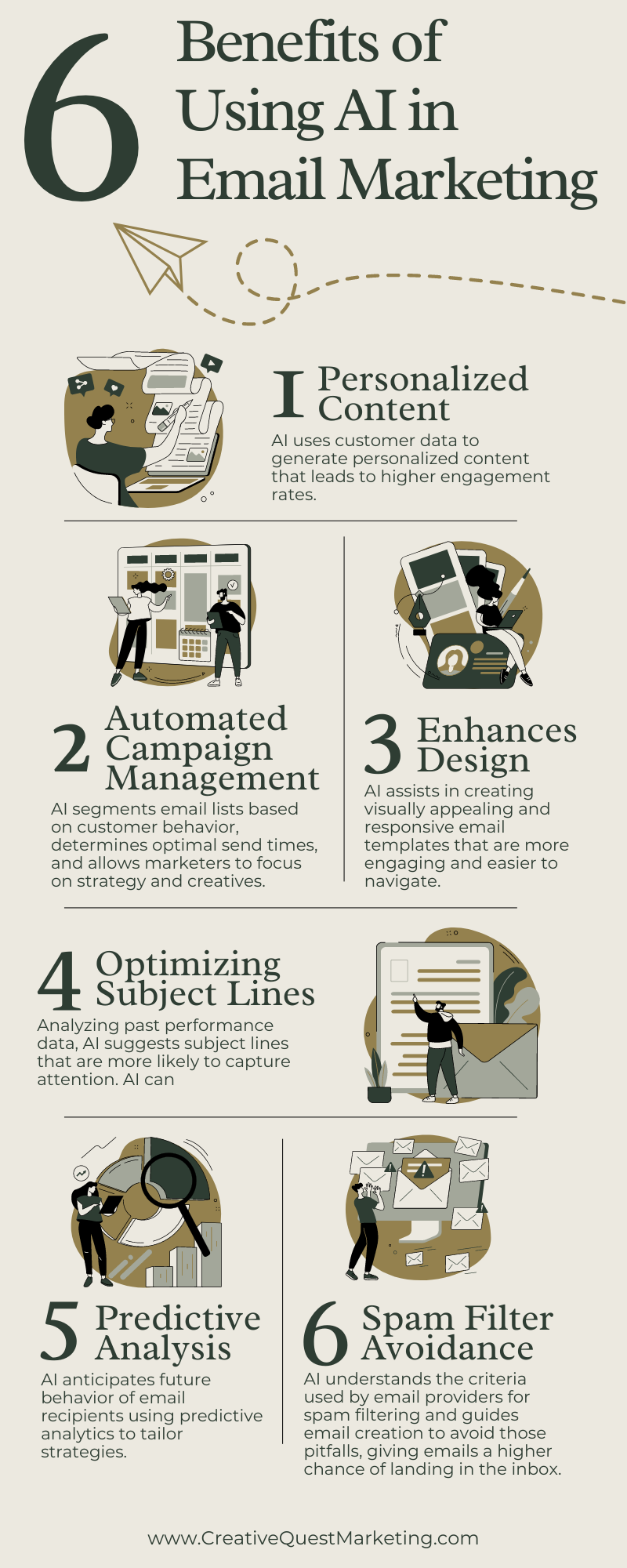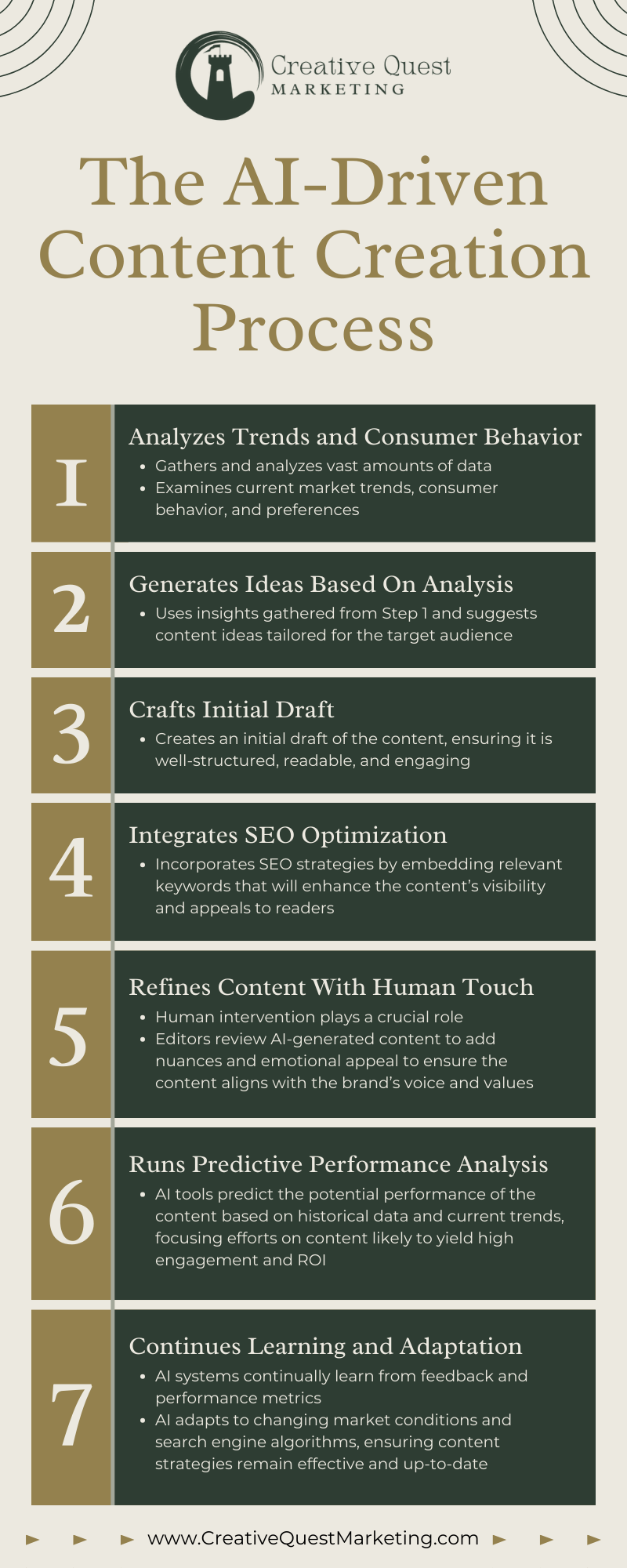In today’s fast-paced digital world, small business marketing faces more challenges than ever, especially when competing with larger corporations that have more resources. However, using AI in your digital marketing strategy has revolutionized the playing field. AI offers cost-effective and efficient solutions for content generation and ideation, akin to the transformative impact of the internet. In this entry, we delve into AI marketing, exploring how small businesses can leverage AI tools to boost their content marketing and ideation strategies. This is crucial for amplifying the impact of your small business marketing. According to Gartner’s latest research:
“Generative AI promises a new level of creativity and enhanced experiences using two primary methods:“
- “Augmented generative AI optimizes existing creative workflows collaboratively with human operators that shape the AI’s generation behavior through reinforcement, such as by saying “more like this” generated element or “less like this.”“
- “Automated generative AI produces unique artifacts in bulk with little human involvement beyond shaping the parameters for production. For example, humans set the brand guidelines for automated copy development.“
The Role of AI in Content Generation
In today’s digital marketing world, the advent of AI has brought about a seismic shift in content generation. This is particularly true in benefiting small businesses with its efficiency and precision. Tools like ChatGPT exemplify the prowess of AI marketing platforms in producing varied, high-quality content rapidly. This is a boon for businesses grappling with time and resource constraints.
AI tools have redefined blogging for small businesses, enabling the creation of engaging and informative posts that are finely tuned to audience interests. This aspect is particularly pivotal for businesses targeting niche markets. AI’s capability to analyze customer data, market trends, and successful past posts allows for the generation of content ideas that resonate deeply with the audience’s preferences. For instance, a small business focusing on eco-friendly products might utilize AI to craft blog posts about sustainability trends, eco-living tips, and industry insights, showcasing their expertise and connecting authentically with their audience. As AI analyzes blog post engagement, it makes other digital marketing activities even easier. This causes prospective customers to become much closer to actual customers. Pairing blogs with video marketing, another area that AI will drastically change, is a way to upskill your internet marketing.
AI-Driven Content Quality and SEO Optimization
The role of AI extends beyond ideation to crafting the content itself. AI tools are adept at producing well-structured, readable, and engaging blog posts. Leveraging natural language processing, AI ensures content is readable and engaging. These factors make generated blog posts accessible. This is critical for businesses that do not have the luxury of hiring professional content writers.
SEO optimization is another arena where AI shines. By seamlessly integrating relevant keywords into blog posts, AI enhances the content’s visibility on search engine results pages. This optimization is crucial for small businesses aiming to bolster their online presence and draw more organic traffic to their site. But it is a departure from meticulously researched traditional marketing methods of SEO. Display advertising will never be the same. Influencer marketing and other marketing use cases will benefit and change from AIs’ impact on SEO.
Maintaining Consistency and Future-Proofing Marketing Strategies
Consistent content production is key in blogging. AI tools aid significantly in this regard. AI tools enable small businesses to maintain a regular posting schedule. It also helps to overcome challenges with time constraints or limited staffing. This consistency is essential for audience engagement and SEO effectiveness. It can reduce a time-intensive activity that small businesses usually hire a digital marketer to do.
Moreover, the use of AI in content creation positions businesses at the forefront of digital marketing trends. It ensures that their marketing strategies are not only relevant today but also adaptable to future advancements in technology. This future-proofing aspect of AI is invaluable, especially as digital marketing serves to continually evolve with advancements like machine learning and marketing automation.
In summary, the integration of AI in content generation empowers small businesses with the tools to produce engaging, SEO-optimized, and consistent content. It marks a significant step forward in digital marketing work, ensuring businesses remain competitive and adaptive in an ever-evolving digital landscape. With AI marketing platforms, digital marketer roles, including digital marketing project managers, are increasingly equipped to meet the challenges of modern marketing, from lead generation to formulating effective digital strategies.
Leverage AI Marketing Tools in Social Media Marketing Content Creation for Small Businesses
In the landscape of digital marketing, social media stands as a vital channel for small businesses to reach and engage their audience. The challenge lies in constantly creating content that is relevant, engaging, and tailored to the platform. This is where AI transforms the way small businesses approach social media content creation.
Crafting Customized Posts
AI’s ability to analyze vast amounts of data makes it an excellent tool for crafting social media posts that resonate with the target audience. By analyzing user interactions, preferences, and behaviors on social media platforms, AI tooling can help create content that is more likely to engage and attract the audience. For example, a small business specializing in artisanal products can use AI tools to determine which types of posts (e.g., product showcases, behind-the-scenes stories, customer testimonials) receive the most engagement and tailor their content strategy accordingly.
Automating Content Scheduling
One of the key benefits of using AI in social media content creation is the automation of scheduling. AI tools can analyze when a business’s audience is most active online and schedule posts for optimal engagement. This ensures content reaches the audience at the right time, increasing visibility and interaction without the need for constant manual input.
Creating Captivating Captions
Captions are a crucial element of social media posts, adding context and personality to the content. AI tools can generate creative and engaging captions that align with the brand’s voice, saving time and enhancing the post’s impact. For a small business, this means being able to maintain a consistent voice across all posts without spending excessive time crafting captions.
Analyzing Trends and Insights
AI can analyze social media trends and insights, providing small businesses with valuable information on what content works best for their audience. This data-driven approach allows for continuous improvement of social media strategies, ensuring that the content remains fresh and relevant.
Visual Content Creation

Beyond text, AI tools like Dall-E by Open.ai can assist in creating visual content for social media posts. By generating images that are visually appealing and relevant to the post’s theme, AI can help small businesses enhance the visual impact of their social media presence. Marketing tools like Magic Design can improve speed and help foster brainstorming sessions too. Marketing teams can go even further by leveraging Midjourney or helping customers who prefer to consume information via videos with Synthesia. AI will impact all digital media. Potential customers will gravitate to those who take the first steps the quickest to leverage these new tools in multichannel marketing.
Personalized Interaction
AI-driven chatbots and automated responses can provide personalized interaction with followers. This not only improves customer service but also ensures that the business is responsive and engaging on social media.
Transforming Email Marketing for Small Businesses with AI

Email marketing remains a cornerstone of digital marketing strategies, especially for small businesses. Email should be one of the first AI marketing use cases that a business owner considers. Its ability to directly reach customers and prospects offers a personalized marketing channel. Integrating AI into email marketing can significantly enhance its effectiveness, automating processes and creating more personalized content.
Learn more about email marketing with our comprehensive guide to email marketing for small businesses.
Personalized Content Creation
AI excels in creating personalized email content that resonates with each recipient. By analyzing customer data, purchase history, and engagement patterns, AI can tailor emails to individual preferences, increasing the likelihood of engagement. For instance, a small retail business can use AI to send personalized product recommendations or special offers based on a customer’s previous purchases, one of the cornerstones of any digital marketing agency, and often one of the common digital marketing challenges, now made easier by AI.
Automating Email Campaigns
AI-driven automation in email marketing allows for more efficient management of campaigns for digital marketers. From segmenting email lists based on customer behavior to scheduling emails for optimal open rates, AI simplifies these processes, saving time and resources. This automation ensures sending emails at the most effective times, thereby increasing the likelihood of recipients reading and acting upon them.
Optimizing Subject Lines
The subject line is a critical element of any email, determining whether it gets opened. AI tools can generate compelling subject lines that are more likely to capture the recipient’s attention. By analyzing what has worked well in the past, AI can suggest subject lines that improve open rates.
Enhancing Email Design
AI can also assist in designing visually appealing email templates optimized for various devices. This not only improves the aesthetic appeal of emails but ensures they are responsive and easy to navigate, enhancing the user experience. It can also help in making sure that consumers see it correctly on various digital marketing channels and display sizes.
A/B Testing

AI enables more efficient A/B testing of email campaigns. It automatically creates variations of emails, forms, and submission windows while measuring performance. This allows it to identify the most effective elements, whether it’s the phrasing of the call-to-action or the layout of the email. This ongoing optimization process helps in continuously improving the effectiveness of email marketing campaigns and can be a cornerstone of your direct marketing.
Predictive Analytics
Using predictive analytics, AI can forecast the future behavior of email recipients. This insight allows small businesses to anticipate customer needs and preferences, tailoring their email marketing strategies accordingly. Businesses can use predictive analytics to identify potential customer churn and proactively send re-engagement emails.
Spam Filter Avoidance
AI aids in crafting emails that have a lower likelihood of landing in the spam folder. By understanding the criteria used by email providers to filter spam, AI can guide the creation of emails that avoid these pitfalls, ensuring higher deliverability rates.
Incorporating AI into email marketing in a business or digital platform offers small businesses a plethora of benefits. These benefits include personalized content creation, automated campaign management, and predictive analytics. As email marketing continues to be a vital part of the digital marketing mix, AI stands as a key tool in maximizing its impact and efficiency.
Enhancing Content Ideation with AI Marketing
In the ever-evolving field of digital marketing, generating fresh and engaging content consistently poses a significant challenge. AI marketing solutions are emerging as a game-changer here. Particularly for small businesses, the integration of AI in marketing strategies brings a new level of efficiency and creativity, transforming the brainstorming process into a more dynamic and productive experience. This approach is essential in developing impactful marketing content and effective social media management strategies.
AI-driven marketing tools are proving invaluable in enhancing brainstorming sessions. They quickly generate a broad range of ideas by analyzing current market trends, consumer behavior, and historical data. This capability is crucial for small businesses in crafting unique and relevant marketing strategies. For example, AI tools can develop new social media campaign ideas, drawing on data about successful strategies in similar industries. This link to Dall-E by OpenAI provides insights into the kind of advanced AI tools available for creative content generation.
Furthermore, AI facilitates enhanced collaboration during brainstorming sessions. By providing real-time data, trend analysis, and market insights, team members can build upon each other’s ideas, guided by AI-driven insights. This collaborative process, backed by AI, often leads to more innovative and effective marketing strategies.
AI also plays a significant role in overcoming creative blocks, a common hurdle during brainstorming sessions. By presenting a variety of perspectives and ideas, AI stimulates creative thinking and inspires new approaches. This can be particularly valuable for small businesses striving to differentiate themselves in competitive markets.
Streamlining Processes and Personalizing Marketing Strategies
Streamlining the brainstorming process is another area where AI tools excel. They organize ideas, categorize them based on potential impact, and even predict the success of different strategies. This helps small businesses prioritize their efforts and focus on the most promising ideas, optimizing their limited resources.
AI’s ability to analyze customer data enables the creation of highly personalized marketing strategies. It identifies specific customer segments and tailors marketing messages to meet their unique preferences and needs, thereby increasing the effectiveness of marketing campaigns.
Real-time market insights provided by AI during brainstorming sessions allow small businesses to stay ahead of trends and adapt their strategies accordingly. This ensures that marketing strategies are relevant and timely.
Incorporating AI marketing tools into brainstorming sessions leads to more data-driven decision-making. AI analyzes vast amounts of data to identify the best practices in marketing, thereby reducing guesswork and enabling more informed decisions.
Exploring the Future of AI In Marketing
For further insights into AI’s role in marketing, consider exploring McKinsey’s research on the bleeding edge of AI. This research delves into the transformative impact of generative AI in the marketing domain. Discover more from the research leader, Gartner. This integration of AI in brainstorming sessions offers small businesses the tools to generate more ideas, enhance collaboration, and make data-driven decisions. This leads to more creative, effective, and personalized marketing strategies. In the current digital marketplace, it is vital to include concepts such as AI marketing, AI in marketing, and AI marketing solutions to effectively compete.
AI-Driven Keyword Insights for Enhanced Digital Marketing
In the realm of digital marketing, the strategic use of keywords is fundamental to enhancing a brand’s online visibility and success. This is where an AI marketing tool becomes a crucial ally for small businesses, revolutionizing the way they approach their digital marketing strategy with enhanced keyword insights. One of many great AI marketing tools that can help with Keyword insight is, appropriately named, Keyword Insights.
Revolutionizing Keyword Strategy With AI
AI’s capability to process and analyze large datasets empowers businesses to identify the most relevant keywords for their products or services. It goes beyond just pinpointing commonly searched terms, delving into long-tail keywords with higher conversion potential. For example, a local bakery could leverage AI to unearth specific keywords like “gluten-free bakery in [City]” or “artisan bread near me,” targeting a more defined audience and driving focused traffic to their site based on analyzing large amounts of data. This type of analysis helps with all the website marketing a business is doing.
Additionally, AI tools are instrumental in analyzing prevailing search trends, providing invaluable insights into consumer search behaviors. This allows businesses to stay ahead by adapting their digital content strategy to align with these evolving trends. For instance, a grocery store noting a surge in interest in organic foods could use AI to identify and target keywords related to organic products, thereby aligning their content with current consumer interests.
Competitor Analysis and SEO Optimization
Another crucial aspect is competitor keyword analysis. AI tools can dissect competitors’ keyword strategies, revealing which keywords are funneling traffic to their sites. This knowledge helps small businesses to pinpoint gaps in their keyword strategies and to identify new opportunities for audience engagement.
Optimizing content for search engines is another area where AI shines. AI tools can adeptly suggest optimal placements for keywords within content, titles, and meta descriptions, enhancing SEO without compromising the content’s natural flow and readability.
Predictive Analytics and Personalized Content Strategies
Beyond current strategies, the use of AI’s predictive capabilities comes into play, forecasting the potential performance of various keywords based on historical data and current trends. This allows businesses to strategically focus their efforts on keywords that are more likely to yield a high return on investment and provide cutting-edge customer insights that will help drive sales and power future marketing campaigns.
Tailoring content to specific customer segments becomes more precise with AI’s advanced analytics. By personalizing keywords to cater to different customer groups, businesses can create content that resonates more effectively, increasing the likelihood of engagement and conversion.
Adapting to Market Changes With Continuous AI Learning
Lastly, the continuous learning and adaptation aspect of AI systems ensures that small businesses can keep their keyword strategies in sync with changing market conditions and search engine algorithms. This ongoing refinement process is key to maintaining a competitive edge in the digital marketplace.
In essence, utilizing AI for keyword insights equips small businesses with a dynamic tool to refine their digital marketing strategies. By identifying relevant keywords, analyzing trends, and adapting strategies accordingly, AI significantly boosts online visibility and search engine rankings, paving the way for enhanced digital marketing success.
AI-Enhanced Competitor Analysis in Digital Marketing
In the dynamic world of digital marketing, small businesses often find themselves navigating a highly competitive landscape, and competitor analysis becomes a vital strategy in carving out a niche. The integration of AI tools in this realm has revolutionized the way businesses approach competitor analysis, offering an unparalleled depth of insights and enabling a more strategic approach to differentiation.
In-Depth Content Analysis Using AI
AI’s capability to perform in-depth analysis of competitors’ content is a game changer. By dissecting blog posts, social media activities, and overall online presence, AI provides a comprehensive view of what content is resonating with audiences, what keywords competitors are targeting, and how often they’re updating their content. This type of analysis is invaluable for businesses like a small e-commerce store, which can use these insights to identify the most engaging topics and formats, thus refining their content strategies. It will also help elevate their brand and brand awareness as they refine their content strategies based on competitors. They will also adjust their products and services to reflect the analysis provided by AI-enhanced digital marketing campaigns.
Identifying Market Gaps and Benchmarking Strategies
The power of AI extends to identifying gaps in the market’s content strategy. It can pinpoint areas overlooked by competitors, presenting unique opportunities for a business to introduce fresh, engaging content. This could range from underexplored topics to innovative angles on popular subjects, allowing a business to stand out. Additionally, AI aids in benchmarking a company’s content strategy against its competitors, comparing key metrics like engagement rates, traffic, and search engine rankings. This not only reveals where a business stands in the competitive landscape but also highlights areas for improvement.
AI’s utility in tracking and analyzing competitors’ marketing campaigns further adds to its value. By understanding what works and what doesn’t in competitors’ promotional activities and customer engagement tactics, businesses gain insights that help shape more effective strategies. Complementing this is AI’s capacity for sentiment analysis, which evaluates the public perception of competitors based on their content and customer interactions. This information is crucial in tailoring marketing messages that resonate more effectively with the target audience.
Predictive Analysis and Automated Reporting
Moreover, AI’s predictive analysis capabilities forecast future trends in competitors’ strategies, enabling businesses to stay ahead of the curve. Automated reporting, another significant aspect of AI in competitor analysis, offers regular and insightful updates without the need for labor-intensive research, saving valuable time and resources.
In summary, incorporating AI into competitor analysis equips small businesses with a robust tool to understand their market position better, identify opportunities for differentiation, and enhance their content strategy. By leveraging AI-driven insights, businesses can make more informed decisions, stay ahead of the competition, and tailor their marketing efforts for maximum impact and relevance.
Revolutionizing Digital Marketing: Leveraging ChatGPT for Enhanced Customer Engagement and Data-Driven Strategies
In the dynamic world of AI marketing, ChatGPT stands out as a versatile tool that’s reshaping how companies approach customer engagement, content creation, and data analysis. As an advanced AI marketing tool, ChatGPT serves as an invaluable assistant for marketing teams, offering a range of capabilities from functioning as an interactive chatbot to providing data-driven insights that ease the burden on marketers. It can also help free up funds that companies have allocated for hiring and instead use it to accelerate what a current marketing team is working on.
Transforming Customer Service With ChatGPT Chatbots
ChatGPT’s application as a chatbot on websites and social media platforms transforms customer service. It interacts in real-time, addressing queries and aiding the purchasing process, which not only enhances customer experience but also optimizes the use of human resources. Beyond customer interaction, ChatGPT’s prowess in analyzing vast data sets is a boon for marketers. It processes customer feedback, social media conversations, and market trends, delivering insights that are crucial for tailoring advertising campaigns and marketing strategies.
Enhancing Content Creation and Personalization with ChatGPT

Where ChatGPT shines is in content creation. It generates engaging and creative marketing content such as email campaigns, blog posts, and social media updates, significantly aiding advertising efforts. Moreover, its deep learning capabilities enable it to offer personalized marketing experiences. By analyzing past customer interactions and preferences, ChatGPT can customize messages and recommendations, thereby elevating customer satisfaction and engagement.
Furthermore, ChatGPT enhances the efficiency of marketing operations. Automating routine tasks like data entry and report generation, allows marketing teams to focus on strategic planning and the creative aspects of marketing campaigns. This integration of ChatGPT in marketing strategies not only streamlines operations but also provides businesses with a competitive edge in AI marketing, optimizing customer interactions, and elevating the overall impact of marketing efforts. As the landscape of digital marketing continues to evolve, AI tools like ChatGPT are becoming indispensable in the toolkits of modern marketers.
Overcoming Challenges with Your AI Marketing Strategy
While AI offers numerous benefits in enhancing your digital marketing efforts, there are challenges to consider:
Maintaining Authenticity
The Revolution of AI In Digital Marketing
In the world of digital marketing, the advent of AI has revolutionized content creation, offering small businesses a powerful tool to amplify their reach and efficiency. However, the challenge lies in ensuring that this AI-generated content stays true to the brand’s unique voice and values. When an AI response goes awry, what is a marketer to do? It’s not just about harnessing the efficiency of AI but also about infusing the content with the essence of the brand’s identity.
Training AI to Reflect Your Brand’s Voice
When it comes to utilizing AI for content creation, the goal is to create a seamless blend of technology and the human touch. The process starts by training the AI with a range of materials that reflect your brand’s style and tone. This could include previous marketing materials, blog posts, or social media content. The idea is to give the AI marketing tool a comprehensive understanding of how your brand communicates, allowing it to generate content that feels authentic to your brand’s voice.
The Collaborative Role of AI and Human Creativity
However, the role of AI should be that of a collaborator rather than a replacement for human creativity. While AI can lay the groundwork by generating initial drafts or content ideas, it’s the human touch that adds the nuances, emotional appeal, and creative flair that resonate with audiences. This collaborative approach ensures that the content, though initially generated by AI, undergoes a human review to maintain the brand’s authenticity.
Ensuring Consistency Across Marketing Channels
Maintaining consistency across different marketing channels is another critical aspect. AI can help ensure that whether it’s an email campaign, a blog post, or a social media update, your content maintains a consistent tone and style, reinforcing brand recognition. However, human oversight is vital in this process to ensure the finer aspects of your brand voice are not lost.
Incorporating audience feedback into the content creation process is essential for refining both AI algorithms and marketing strategies. This feedback can provide insights into what aspects of your content are hitting the mark and what areas need improvement. Regularly updating AI tools with this feedback can lead to more personalized and impactful content, thereby enhancing audience engagement and loyalty.
Balancing Technology and Human Creativity for Brand Authenticity
In the end, the key to leveraging AI in maintaining brand authenticity lies in achieving the right balance between technological efficiency and human creativity. It’s about using AI as a tool to enhance your marketing efforts while ensuring that the heart and soul of your brand’s message remain intact and resonant with your audience. This balance is crucial for small businesses aiming to establish a strong brand identity in the competitive digital marketplace.
Quality Control
While AI significantly enhances the efficiency and reach of content generation for small businesses, it’s crucial to remember that the quality and relevance of this content are paramount. Ensuring that AI-generated content maintains high standards of quality requires a meticulous process of review and editing.
Human Intervention in AI Content Creation
AI, though advanced in its capabilities, is not infallible. It can sometimes miss the subtleties of language, cultural nuances, or the specific tone that a brand aims to convey. This is where human intervention becomes essential. After an AI marketing tool has produced a draft, human marketers need to step in, review the content, and make necessary adjustments so that the final product meets the customer’s expectations. This process also ensures that the final output aligns with the brand’s messaging, adheres to stylistic guidelines, and resonates with the intended audience. A great tool to help with this, even though it is also AI and still needs to be double-checked is Hemingway Editor.
This editorial process also involves checking for factual accuracy. AI might draw from a vast pool of information, but it can occasionally include outdated or incorrect data. A human editor, with an understanding of current trends and industry developments, can verify the accuracy of information and update content as necessary.
Balancing SEO Optimization With Natural Engagement
Moreover, while AI can follow guidelines for SEO optimization, human editors play a critical role in ensuring that the content feels natural and engaging, rather than being overly optimized or mechanical. The editor can refine keyword usage to ensure that it fits seamlessly into the content, preserving its readability and appeal.
Preventing Bias In AI-Generated Content
Quality control also involves ensuring that AI-generated content is not biased. AI systems can unintentionally perpetuate biases in the training data. Having human editors helps recognize and fix any biases, making the content inclusive and respectful to various audiences.
In sum, the quality control of AI-generated content is a collaborative effort between AI efficiency and human expertise. This partnership ensures that the content not only reaches a wider audience quickly but also maintains the high standards of quality and relevance that are crucial for effective communication and brand integrity.
Finally:
For small businesses, AI in digital marketing offers an invaluable resource for content generation and ideation. By embracing these tools, businesses like those served by Creative Quest Marketing can save time, reduce costs, and increase the effectiveness of their marketing efforts. In the next entry, we will explore how AI tools like ChatGPT can enhance email marketing for small businesses. AI can help both your inbound marketing, your online advertising, and your website traffic. It will continue to grow and influence each product or service that you offer. Your digital channels will need to grow and evolve as will each advertisement that you put out.
What is cutting-edge AI digital marketing today will become commonplace in every digital marketing plan in the next 24 months. Finding an AI marketing platform, investing in your digital strategy, and learning about artificial intelligence will influence a variety of your marketing tactics and almost every piece of your marketing technology. Take any digital marketing courses that are available and, most of all, do what digital marketers do, adjust quickly, and always expand the variety of marketing tactics at your disposal.



